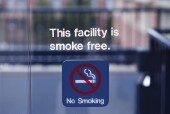
THURSDAY, Oct. 2, 2014 (HealthDay News) — Making all government-subsidized housing in the United States smoke-free could save nearly half a billion dollars a year in health care and housing-related costs, a new study indicates.
The total annual savings of $497 million would include $310 million in secondhand smoke-related health care, $134 million in renovation costs and $53 million in smoking-related fire losses, the U.S. Centers for Disease Control and Prevention researchers said.
Just banning smoking in public housing either owned or operated by a government housing authority would save $153 million a year, according to the study published Oct. 2 in the journal Preventing Chronic Disease.
“This important study is further evidence that smoke-free policies are a win-win. They not only protect the public’s health, but also save significant sums of money,” Dr. Tim McAfee, director of the CDC’s Office on Smoking and Health, said in an agency news release.
“Prohibiting smoking in subsidized housing eliminates one of the leading disparities related to secondhand smoke exposure, as children, the elderly, the disabled and low-income Americans are disproportionately affected,” he added.
The state-by-state annual savings of making government-subsidized housing smoke-free would range from $580,000 in Wyoming to $125 million in New York. The savings of prohibiting smoking only in public housing would vary from about $130,000 in Wyoming to $58 million in New York.
Nearly 7 million Americans live in government-subsidized multi-unit housing, including about 2 million in public housing. Even people who live in nonsmoking apartments in multi-unit buildings are susceptible to secondhand smoke exposure because the smoke can get through ventilation systems and windows.
There is no safe level of exposure to secondhand smoke, according to the U.S. Surgeon General. As many as 40,000 people die each year as a result of secondhand smoke exposure, the U.S. government estimates. Exposure to secondhand smoke contributes to heart disease and cancer risk in adults, and increases the risk of asthma and respiratory infections in children, according to the news release. Secondhand smoke also increases the risk of sudden infant death syndrome (SIDS), the CDC says.
“Already, over 500 public housing agencies have adopted some form of a smoke-free policy, protecting approximately 200,000 families,” Matthew Ammon, acting director of the Department of Housing and Urban Development’s (HUD) Office of Lead Hazard Control and Healthy Homes, said in the news release.
“This study reinforces HUD’s work that promotes health and reduces costs by encouraging public housing agencies, multi-family housing owners and agents, as well as residents, to adopt and implement smoke-free housing policies,” he added.
More information
The U.S. National Library of Medicine has more about secondhand smoke.
Copyright © 2026 HealthDay. All rights reserved.

